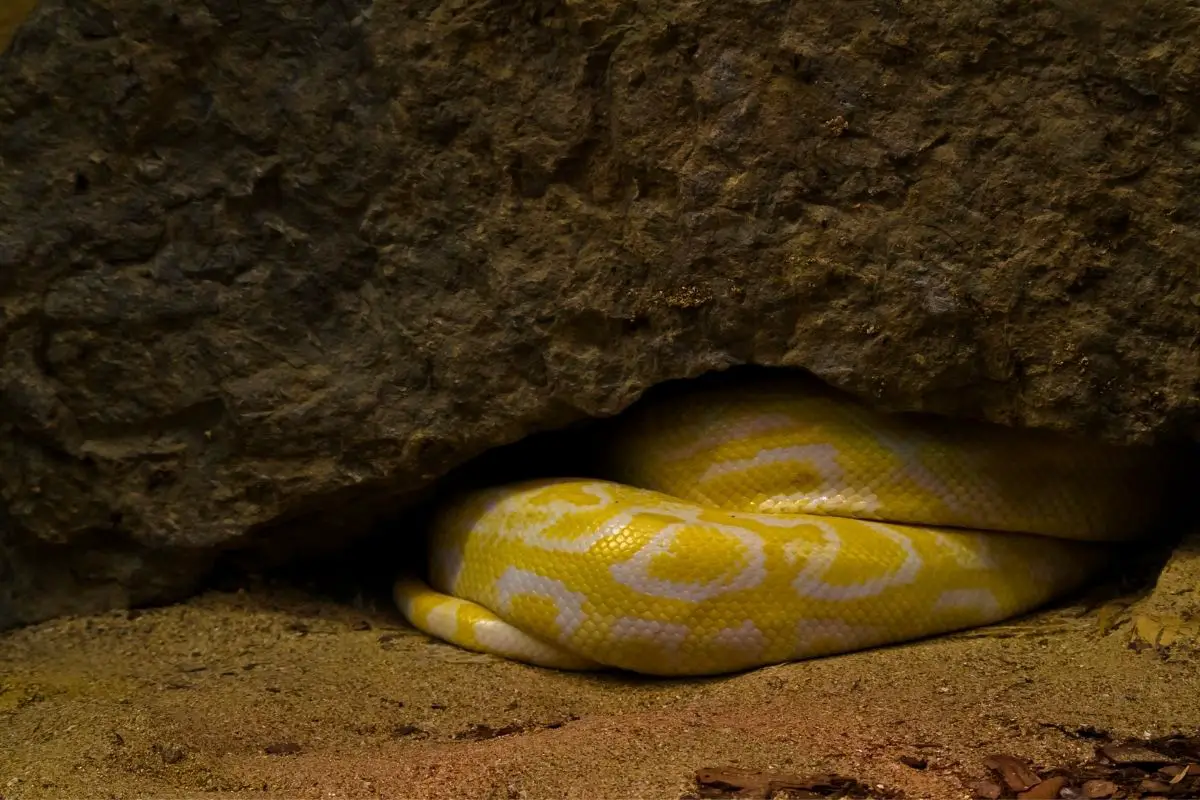I know, I know… you’ve spent hours cleaning your house and now it’s time to relax. Do not worry, there are no snakes in the living room! Or are there?
The fear that there is a snake hibernating somewhere in the house that may also wake up at any moment and attack you or your child is a fear many parents share, and it’s not an unfounded fear.
So, do snakes hibernate in houses? Snakes hibernate in houses indeed, but not in living rooms. Snakes will often hibernate in people’s old basements and cisterns as it provides a warm, calm, and humid place that’s perfect for a hibernating snake, and will usually prefer to come back to the same spot the following winters.
So while I wish I could tell you that there is definitely no snake in your basement, I can’t, because there actually could be a snake in your basement. It’s quite rare to find them in living rooms or attics since snakes have a difficult time climbing walls, but sliding downstairs and into your basement is not much of a challenge.
Keep reading as we explore why do snakes hibernate in houses, how to know if there is a snake hidden somewhere in your house, and what to do in case you found one.
Contents
Do Snakes Hibernate?
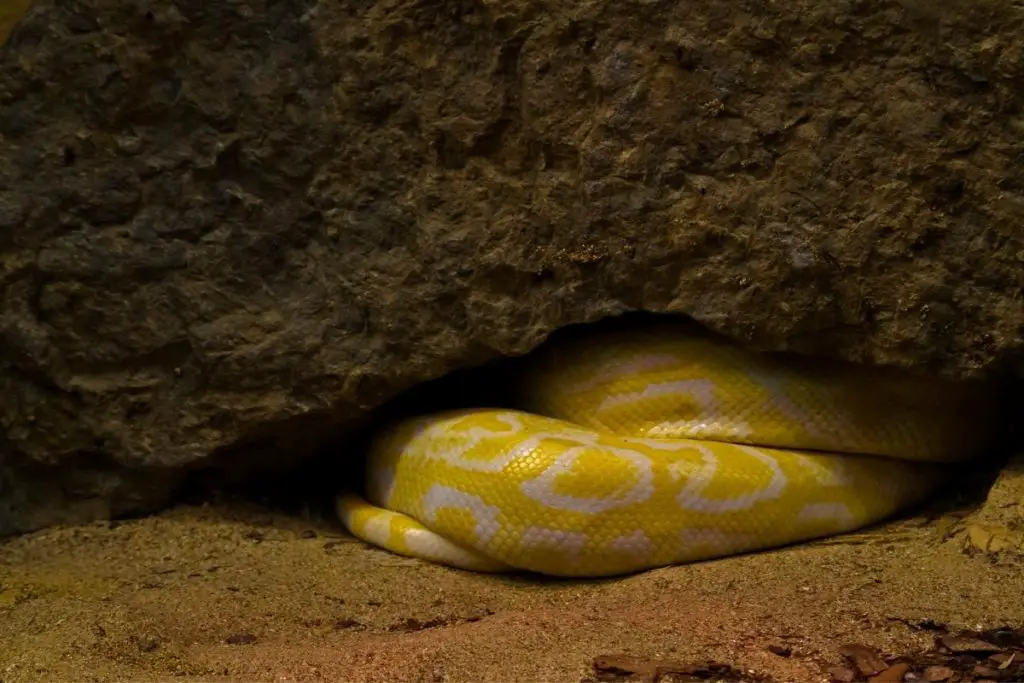
There is something very important that we must mention here before we get into the details of the snake hibernating your house (probably); Snakes don’t actually hibernate, not in the same way other animals hibernate.
What snakes actually do is that they enter this state that’s very much like hibernation. It has decreased physical activity that is referred to as brumation. It’s not only snakes that do brumation, as we’ve seen it in other reptiles as well.
Brumation is also referred to as dormancy, torpor, or wintering depending on who you’re asking, but they are basically all the same thing.
Snakes go into hibernation to save energy and survive the harsh winter. They don’t need a lot of energy in this condition.
Snakes don’t have to consume foods to keep their physiological processes running properly. Snakes may enter human homes for protection in some situations.
Their main objective is to locate a refuge that’s safe, quiet, and warm, where they will not be bothered by predators, rain, or snow.
Snakes do not intent to cause you any harm when they come into your home, but it definitely can be a shock when you find one hiding where you don’t expect it.
Snakes like to crawl into houses and other buildings through gaps in the foundation, open windows or doors, damaged pipes and vents, etc… Once inside your house they will seek out areas where it is dark and warm such as attics and basements (especially if there has been some renovation work done), storage spaces under the house, and garages.
Where do Snakes usually hibernate?
Snakes like to hibernate in dark, hidden places where they are unlikely to be found. They will, sometimes, also sleep in snake dens alone or in groups for warmth and protection.
Some of the spots where snakes will hibernate includes rock crevices, squirrel burrows, and under tree logs and rodent nests.
If your house can provide such dark and warm spots, the snake may see it a suitable hibernating space as well.
When Do Snakes Start Hibernating?
The timing and place that a snake starts to hibernate are species and location-dependent. The majority of snakes begin brumation in late fall and finish in early spring. Snakes may abandon brumation in colder climes.
Why Do Snakes Hibernate?
Snakes Hibernate for the same reason all other animals do: to save energy. When temperatures drop in the winter, they may save vital physiological resources by hibernating. Food is also more scarce in the winter, so some snakes will find it easier to hibernate and just wait out the winter.
Do Snakes hibernate in homes and houses?
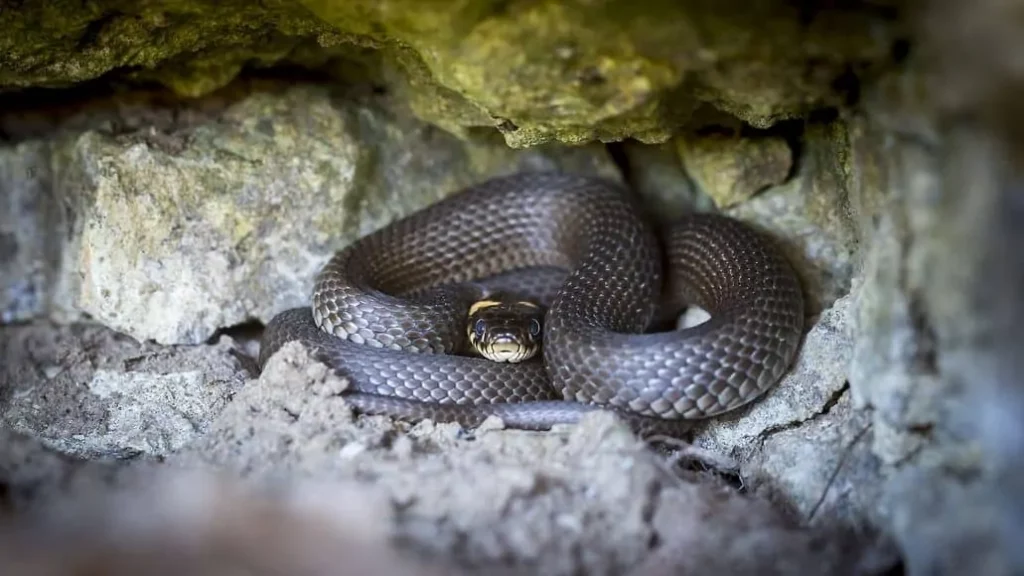
As mentioned earlier, snakes may try to hibernate in houses to save energy and stay safe during the cold winter months. The snake is thinking of your house as a shelter, and it doesn’t want to harm you in any way. In fact, the snake will try to do its best to avoid you altogether.
This doesn’t mean that you will be happy about the snake living in your house, and since snakes don’t really understand what consent and permission means, you will need to do a few things to make sure this doesn’t happen.
Why do snakes hibernate in houses?
Snakes will hibernate in houses to stay safe from the outside world during harsh conditions like cold weather and to save energy when the food it consumes is scarce. S
A snake hibernating in your house is unlikely to harm your or anyone in the house because it doesn’t intent to get caught, and an incident will only happen if you or someone else find the snake by mistake and surprise it.
However, no one wants a snake to come uninvited in their house and spend the winter with them, and there are ways you can prevent this from happening.
How to protect your house and family from snakes
Rather than risking your dog being harmed by a snake, or becoming ill after consuming one, you may take steps to prevent them on your own property. In my opinion, this is less hazardous than instructing your dog to kill snakes.
Use a Snake Repellent
Consider using a snake repellent to keep the snakes away. There are plenty of options to choose from in the market, and while I am a snake owner myself, I don’t want wild snakes in my house, so I have tested a lot of them.
The most effective one and, in my experience, the best snake repellent for the price is the excellent Victor Snake-Away Repellent.
Regardless of the cheesy name, in my opinion, it actually works quite well and it doesn’t cost a lot. I also had a friend who had a serious issue with snakes (he’s in Florida), and he has told me that it works great for him as well.

You can check it out on Amazon here or by clicking on the image above.
Keep the Grass Short
Try your best to maintain your lawn throughout the summer as it grows. This will deter snakes rather than trying dog feces. What’s the reason? Snakes enjoy the concealment that long grass provides them.
When grass is short, snakes are unable to move freely without drawing attention from predators. It will also assist you in identifying them before stepping on one!
Don’t Leave water outside
Snakes like water, and while it’s nearly impossible to remove a pond or stream from your yard, you should get rid of any additional accessible water sources. This implies cleaning up any moist zones, such as tarps where water may accumulate, or a children’s paddling pool.
Maintain the Yard as Clean As possible
Snakes prefer to hide in messy locations, and they flourish in unclean settings. A snake could crawl into your yard if you have trash littering it. Woodpiles are ideal hiding places for snakes.
Snakes and rodents are attracted to messes, in particular food or animal waste. This implies that if you’re feeding your dog outside, the food bowls should be cleaned and refitted on a regular basis. The same goes for bird feeders.
Rats and mice may enter your yard as a result of the garbage, which will entice snakes seeking to hunt and consume them.
Install a perch pole
Perches may be used to attract hawks and owls to an area, which helps control snake populations. Poles should be placed in view of the yard and surrounding territory so that the hawk or owl has a clear view of the yard and surroundings.
Seal any cracks
To prevent snakes from entering your house, sidewalks, and foundations, seal cracks and crevices.
Consider purchasing an energy audit. An energy audit may help you locate air gaps and fissures that allow cold air to escape the home – these same flaws and crevices can be used by snakes and other small animals.
How to tell if you have a snake hibernating in your house?
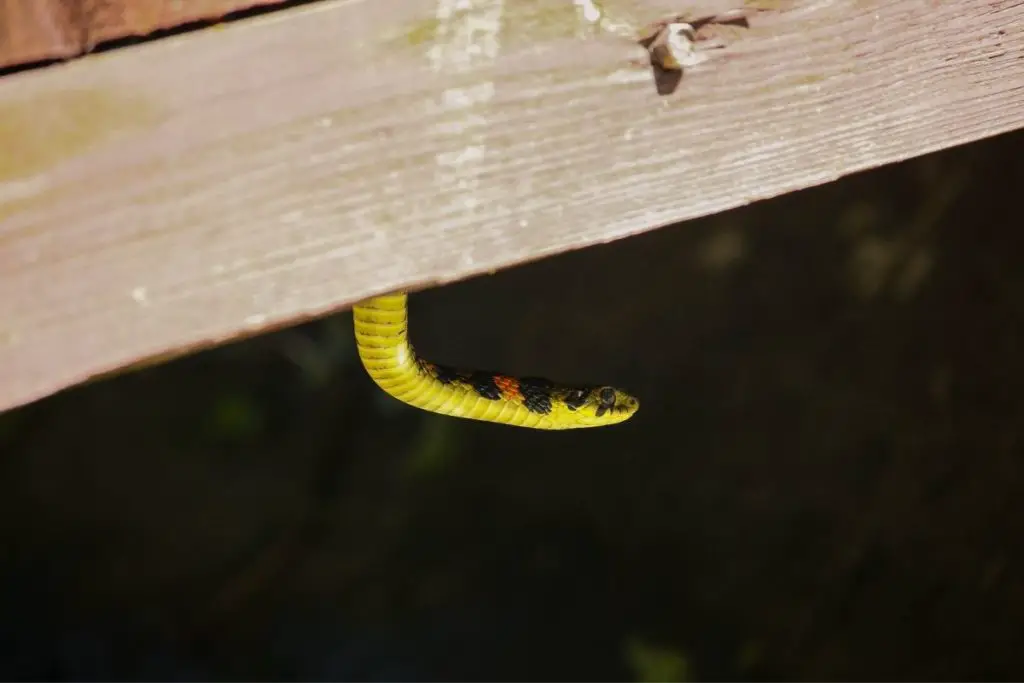
You will usually only discover a snake once you stumble upon it. Snakes are stealthy animals that will keep out of your way. They don’t leave obvious traces, like as some pests do. You will not find snake droppings around the house or the remainders of their meals.
If a snake sheds its skin while in your house, you may find it without seeing the creature itself.
Another way you may find a snake is in your home is if your pet finds it. Dogs and cats are really good at discovering unwanted guests in your house, but cats especially will detect snakes since they are natural snake predators.
Cats and dogs will also kill snakes, and sometimes just the presence of a dog or a cat can keep the snakes away from your home as snakes will try to avoid them as much as possible.
If you don’t already have a pet, you should consider one of these dogs that can kill snakes.
What to do when you discover a Hibernating Snake on your Propery?
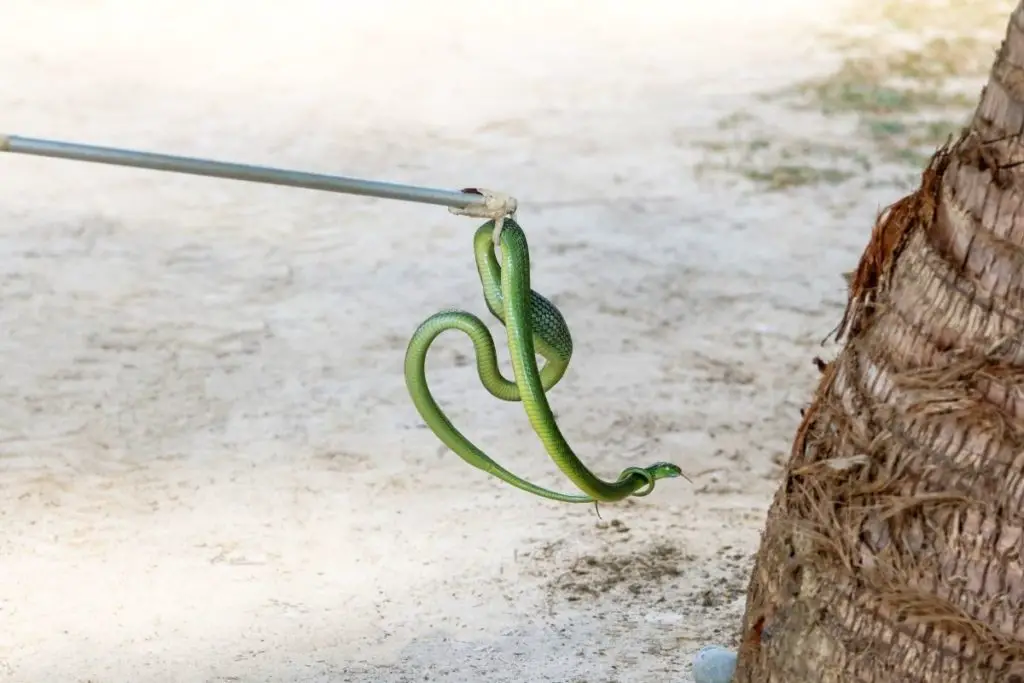
If you are so lucky as to actually find a snake hibernating in your house, stay away from it. The snake is probably not a threat, but you also probably do not have the experience or the tools to handle it if it is.
If the snake is still hibernating, find the number of an exterminator and call them to handle the snake. If you are sure the snake in not venomous and you have some experience with snakes in the past, you can use a snake trap.
Conclusion
Snakes can and will hibernate in houses if the opportunity arises. You can take preventative measures to ensure they don’t enter your home in the first place, but if you do find one, it’s best to call an expert exterminator to remove it safely. Do not try to catch or kill the snake on your own as you could get hurt.
Helpful Resources
HIBERNATION VS. BRUMATION: CHANGING SEASONS
If you like this article, please share it!

